![]()

Branded (1920)
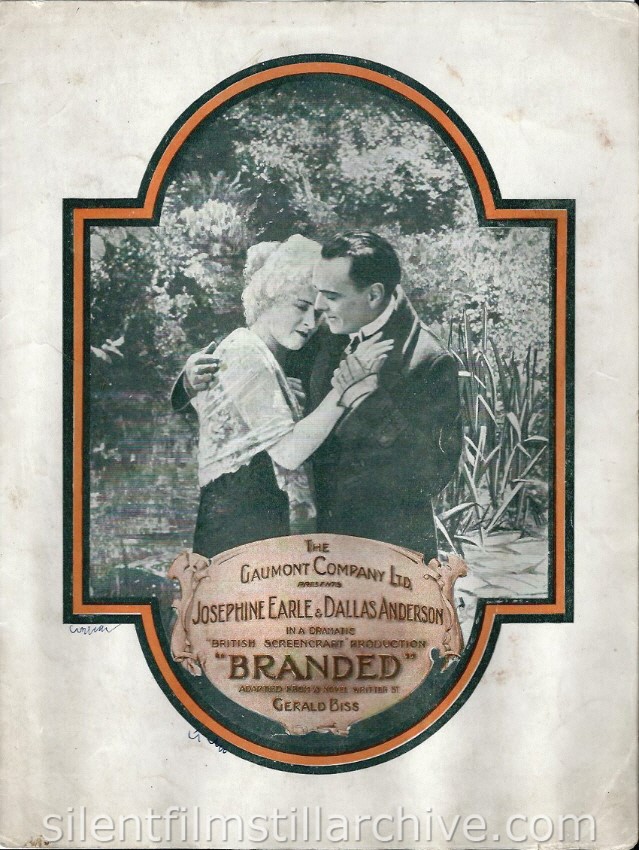
THE
GAUMONT COMPANY LTD.
presents
JOSEPHINE
EARLE & DALLAS ANDERSON
In A Dramatic
"BRITISH SCREENCRAFT" PRODUCTION
"BRANDED"
Adapted From a Novel Written By
GERALD BOSS
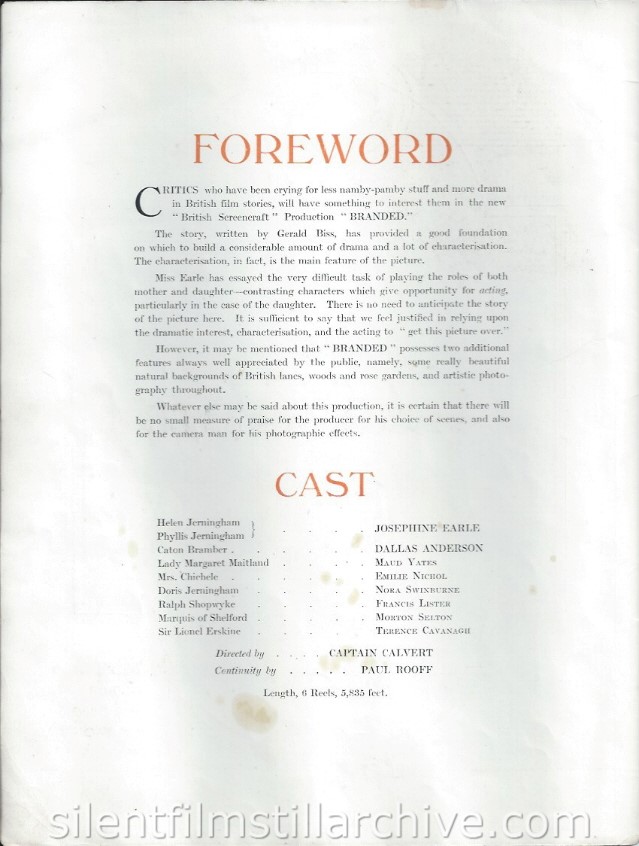
FORWARD
CRITICS who have been crying for less namby-pamby stuff and more drama in British film stories, will have something to interest them in the new “British Screencraft” production “BRANDED.”
The story, written by Gerald Biss, has provided a goodf oundation on which to build a considerable amount of drama and a lot of characterisation. The characterisation, in fact, is themain feature of the picture.
Miss Earle has essayed the very difficult task of playing the roles of both mother and daughter – contrasting characters which give opportunity for acting, particularly in the case of the daughter. There is no need to anticipate the story of the picture here. It is sufficient to say that we feel justified in relying upon the dramatic interest, characterisation, and the acting to “get this picture over.”
However, it may be mentioned that “BRANDED” posses two additional features always well appreciated by the public, namely, some really beautiful natural backgrounds of British lanes, woods, and rose gardens, and artistic photography throughout.
Whatever else may be said about this production, it is certain that there will be no small measure of praise for the producer for his choice of scenes, and also for the camera man for his photographic effects.
CAST
|
Helen Jerningham |
JOSEPHINE EARLE |
|
Phyllis Jerningham |
|
|
Caton Bramber |
DALLAS ANDERSON |
|
Lady Margaret Maitland |
Maud Yates |
|
Mrs. Chichele |
Emile Nichol |
|
Doris Jerningham |
Nora Swinburne |
|
Ralph Shopwyke |
Francis Lister |
|
Marquis of Shelford |
Morton Selton |
|
Sir Lionel Erskine |
Terence Cavanaugh |
Directed by CAPTAIN CALVERT (E. H. Calvert)
Continuity by PAUL ROOF
Length, 6 Reels, 5,835 feet.
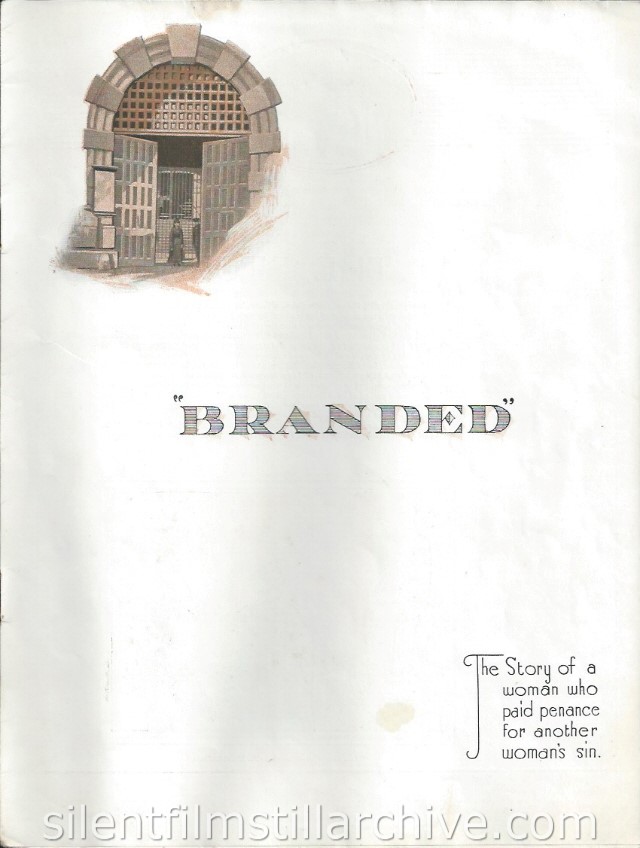
“BRANDED”
The Story of a woman who paid penance for another woman’s sin.
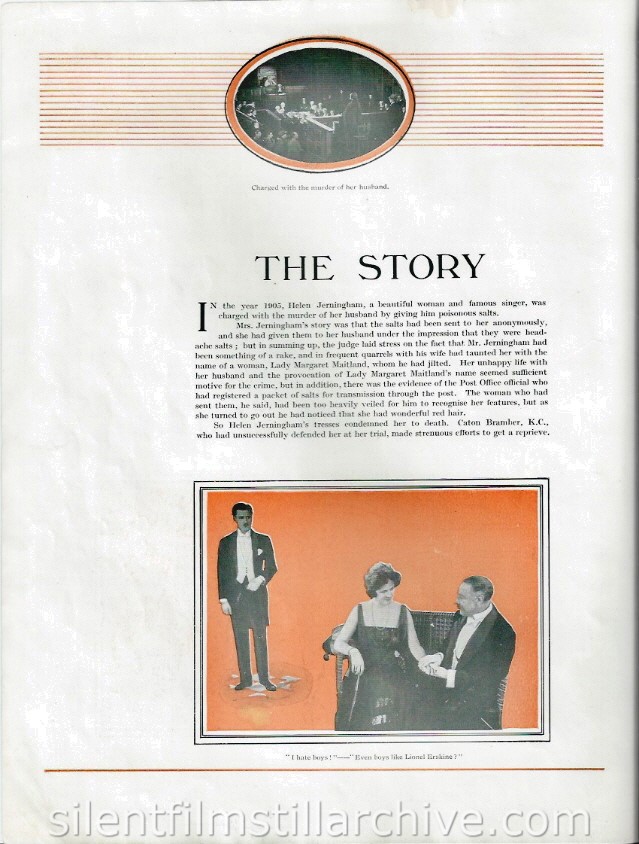
Charged with the murder of her husband.
THE STORY
IN the year 1905, Helen Jerningham, a beautiful woman and famous singer, was charged with the murder of her husband by giving him poisonous salts.
Mrs. Jerningham’s story was that the salts had been sent to her anonymously, and she had given them to her husband under the impression that they were headache salts; but in summing up, the judge laid stress on the fact that Mr. Jerningham had been something of a rake, and in frequent quarrels with his wife had taunted her with the name of a woman, Lady Margaret Maitland, whom he had jilted. Her unhappy life with her husband and the provocation of Lady Margaret Maitland’s name seemed sufficient motive for the crime, but in addition, there was the evidence of the Post Office official who had registered a packet of salts for transmission through the post. The woman who had sent them, he said, had been too heavily veiled for him to recognize her features, but as she turned to go out he had noticed that she had wonderful red hair.
So Helen Jerningham’s tresses condemned her to death. Caton Bramber, K.C., who had unsuccessfully defended her at her trial, made strenuous efforts to get a reprieve.
“I hate boys!” – “Even boys like Lionel Erskine?”
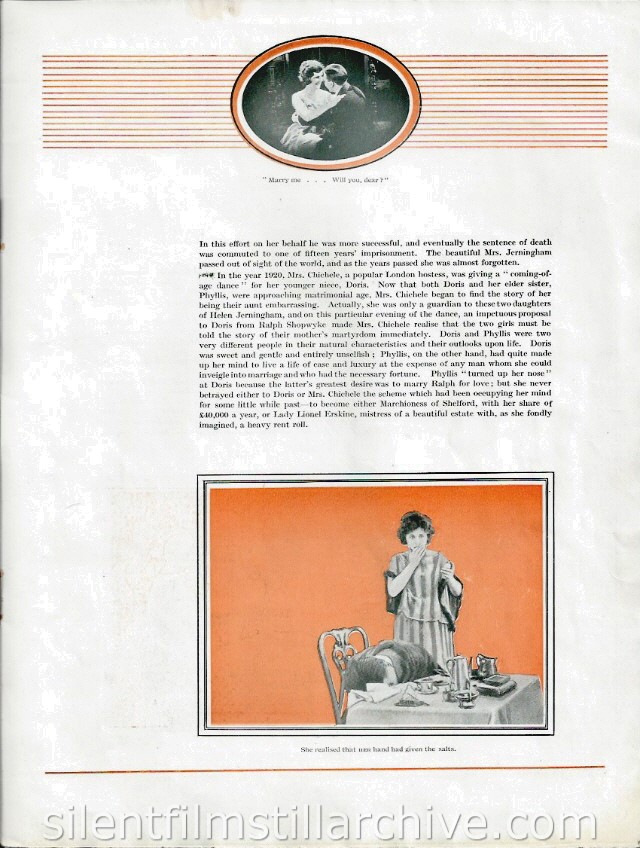
“Marry me... Will you, dear?”
In this effort on her behalf he was more successful, and eventually the sentence of death was commuted to one of fifteen years’ imprisonment. The beautiful Mrs. Jerningham passed out of sight of the world, and as the years passed she was almost forgotten.
In the year 1920, Mrs. Chichele, a popular London hostess,was giving a “coming-of-age dance” for her younger niece, Doris. Now that both Doris and her elder sister, Phyllis, were approaching matrimonial age, Mrs. Chichele began to find the story of her being their aunt embarrassing. Actually, she was only a guardian to these two daughters of Helen Jeringham, and on this particular evening of the dance, an impetuous proposal to Doris from Ralph Shopwyke made Mrs. Chichele realise that the two girls must be told the story of their mother’s martyrdom immediately. Doris and Phyllis were two very different people in their natural characteristics and their outlooks upon life. Doris was sweet and gentle and entirely unselfish; Phyllis, on the other hand, had quite made up her mind to life a life of ease and luxury at the expense of any man whom she could inveigle into marriage and who had the necessary fortune. Phyllis “turned up her nose” at Doris because the latter’s greatest desire was to marry Ralph for love; but she never betrayed either to Doris or Mrs. Chichele the scheme which had been occupying her mind for some little while past – to become either Marchioness of Shelford, with her share of £40,000 a year, or Lady Lionel Erskine, mistress of a beautiful estate with, as she fondly imagined, a heavy rent roll.
She realized that her hand had given the salts.
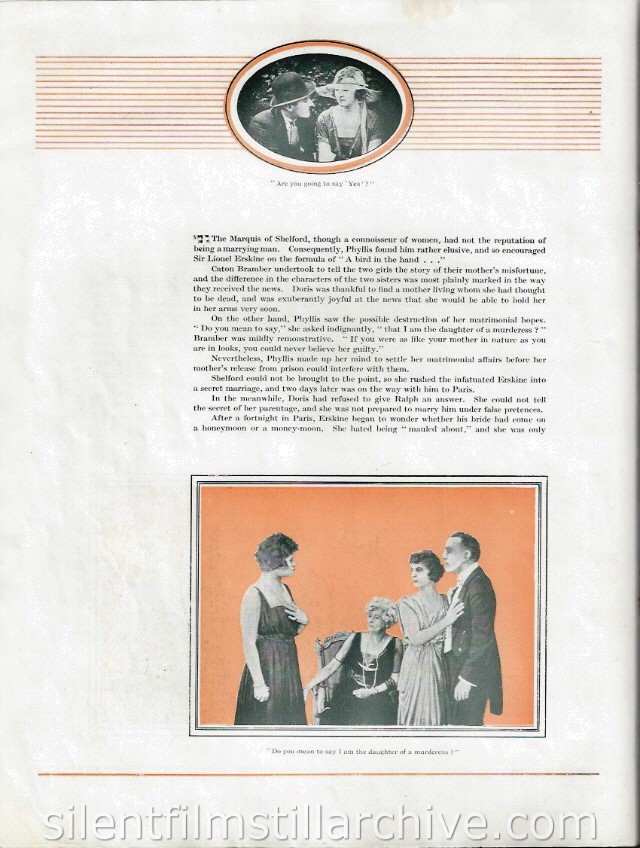
“Are you going to say, ‘Yes’?”
The Marquis of Shelford, though a connoisseur of women, had not the reputation of being a marrying man. Consequently, Phyllis found him rather elusive, and so encouraged Sir Lionel Erskine on the formula of “A bird in the hand&ldots;”
Caton Bramber undertook to tell the two girls the story of their mother’s misfortune, and the difference in the characters of the two sisters was most plainly marked in the way they received the news. Doris was thankful to find a mother living whom she had thought to be dead, and was exuberantly joyful at the news that she would be able to hold her in her arms very soon.
On the other hand, Phyllis saw the possible destruction of her matrimonial hopes. “Do you mean to say,” she asked indignantly, “that I am the daughter of a murderess?” Bramber was mildly remonstrative. “If you were as like your mother in nature as you are in looks, you could never believe her guilty.”
Nevertheless, Phyllis made up her mind to settle her matrimonial affairs before her mother’s release from prison could interfere with them.
Shelford could not be brought to the point, so she rushed the infatuated Erskine into a secret marriage, and two days later was on the way with him to Paris.
In the meanwhile, Doris had refused to give Ralph an answer. She could not tell the secret of her parentage, and she was not prepared to marry him under false pretences.
After a fortnight in Paris, Erskine began to wonder whether his bride had come on a honeymoon or a money-moon. She hated being “mauled about,” and she was only
“Do you mean to say I am the daughter of a murderess?”
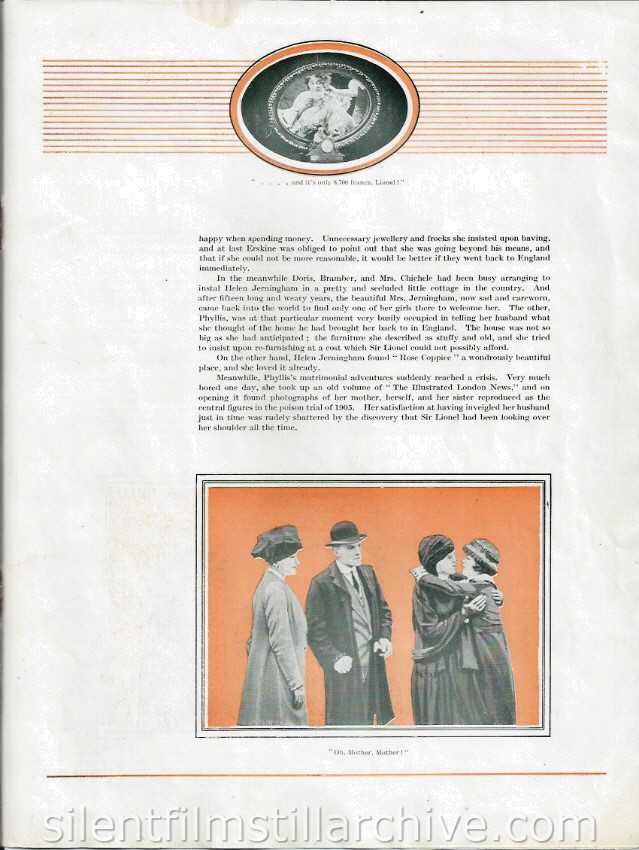
“.... And its only 8,700 francs, Lionel!”
Happy when spending money. Unnecessary jewelry and frocks she insisted upon having, and at last Erskine was obliged to point out that she was going beyond his means, and that if she could not be more reasonable, it would be better if they went back to England immediately.
In the meanwhile Doris, Bramber, and Mrs. Chichele had been busy arranging to instal (sic) Helen Jerningham in a pretty and secluded little cottage in the country. And after fifteen long and weary years, the beautiful Mrs. Jerningham, now sad and careworn, came back into the world to find only one of her girls there to welcome her. The other, Phyllis, was at that particular moment very busily occupied in telling her husband what she thought of the home he had brought her back to in England. The house was not so big as she had anticipated; the furniture she described as stuffy and old, and she tried to insist upon re-furnishing at a cost which Sir Lionel could not possibly afford.
On the other hand, Helen Jerningham found “Rose Coppice” a wondrously beautiful place, and she loved it already.
Meanwhile, Phyllis’s matrimonial adventures suddenly reached a crisis. Very much bored one day, she took up an old volume of “The Illustrated London News,” and on opening it found photographs of her mother, herself, and her sister reproduced as the central figures in the poison trial of 1905. Her satisfaction at having inveigled her husband just in time was rudely shattered by the discovery that Sir Lionel had been looking over her shoulder all the time.
“Oh, Mother, Mother!”
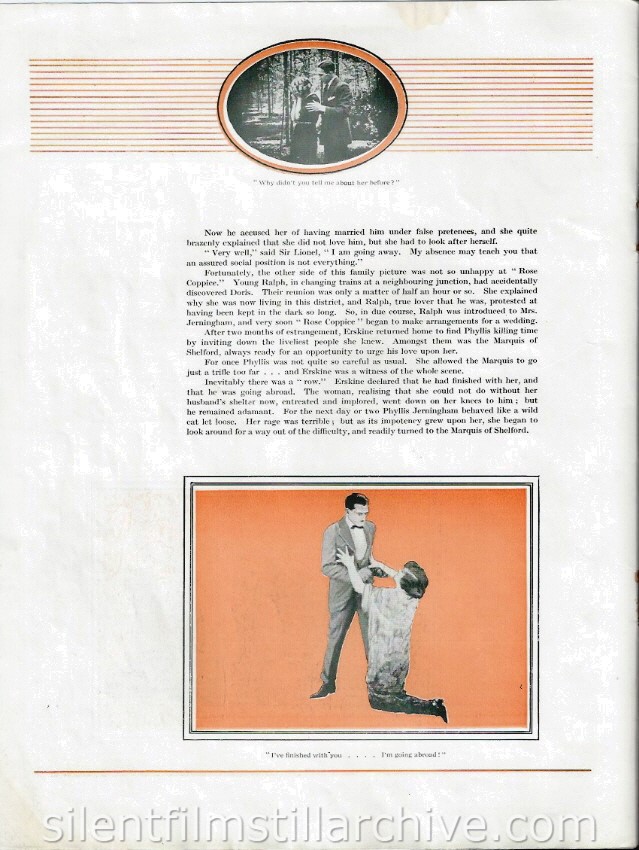
“Why didn’t you tell me about her before?”
Now he accused her of having married him under false pretenses,and she quite brazenly explained that she did not love him, but she had to look after herself.
“Very well,” said Sir Lionel, “I am going away. My absence may teach you that an assured social position is not everything.”
Fortunately, the other side of this family picture was not so unhappy at “Rose Coppice.” Young Ralph, in changing trains at a neighbouring junction, had accidentally discovered Doris. Their reunion was only a matter of half an hour or so. She explained why she was now living in this district, and Ralph, true lover that he was, protested at having been kept in the dark so long. So, in due course, Ralph was introduced to Mrs. Jerningham, and very soon “Rose Coppice” began to make arrangements for a wedding.
After two months of estrangement, Erskine returned home to find Phyllis killing time by inviting down the liveliest people she knew. Amongst them was the Marquis of Shelford, always ready for an opportunity to urge his love upon her.
For once Phyllis was not quite so careful as usual. She allowed the Marquis to go just a trifle too far… and Erskine was a witness of the whole scene.
Inevitably there was a “row.” Erskine declared that he had finished with her, and that he was going abroad. The woman, realising that she could not do without her husband’s shelter now, entreated and implored, went down on her knees to him; but he remained adamant. For the next day or two Phyllis Jerningham behaved like a wild cat let loose. Her rage was terrible; but as it impotency grew upon her, she began to look around for a way out of the difficulty, and readily turned to the Marquis of Shelford.
“I’ve finished with you... I’m going abroad!”
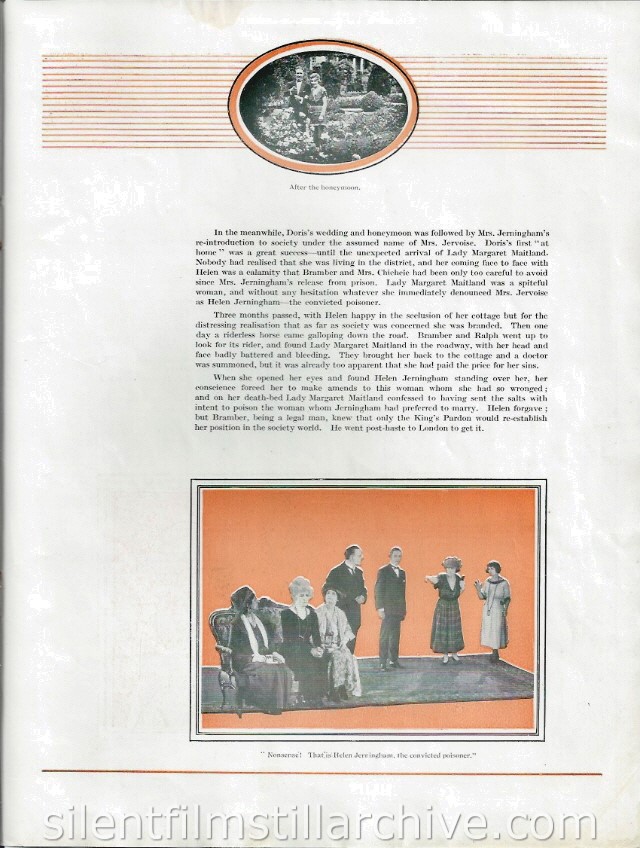
After the honeymoon.
In the meantime, Doris’s wedding and honeymoon was followed by Mrs. Jerningham’s re-introduction to society under the assumed name of Mrs. Jervoise. Doris’s first “at home” was a great success – until the unexpected arrival of Lady Margaret Maitland. Nobody has realised that she was living inthe district, and her coming face to face with Helen was a calamity that Bramber and Mrs. Chichle had been only too careful to avoid since Mrs. Jerningham’s release from prison. Lady Margaret Maitland was a spiteful woman,and without any hesitation whatever she immediately denounced Mrs. Jervoise as Helen Jerningham – the convicted poisoner.
There months passed, with Helen happy in the seclusion of her cottage but for the distressing realisation that as far as society was concerned she was branded. Then one day a riderless horse came galloping downthe road. Bramber and Ralph went up to look for its rider, and found Lady Margaret Maitland in the roadway, with her head and face badly battered and bleeding. They brought her back to the cottage and a doctor was summoned, but it was already too apparent that she had paid the price for her sins.
When she opened her eyes and found Helen Jerningham standing over her, her conscience forced her to make amends to this woman whom she had so wronged; and on her death-bed Lady Margaret Maitland confessed to having sent the salts with intent to poison the woman who Jerningham preferred to marry. Helen forgave; but Bramber, being a legal man, knew that only the King’s Pardon would re-establish her position in the society world. He went post-haste to London to get it.
“Nonsense! That is Helen Jerningham, the convicted poisoner.”
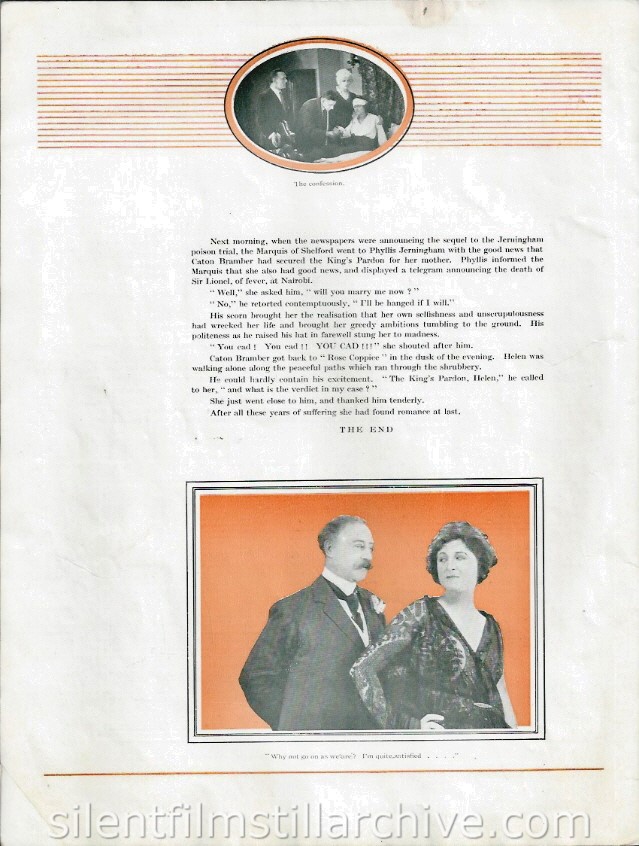
The confession.
Next morning, when the newspapers were announcing the sequel to the Jerningham poson trial, the Marquis of Shelford to to Phyllis Jerningham with the good news that Caton Bramber had secured the King’s Pardon for her mother. Phyllis informed the Marquis that she also had good news, and displayed a telegram announcing the death of Sir Lionel, of fever, at Nairobi.
“Well,” she asked him, “will you marry me now?”
His scorn brought her the realisation that her own selfishness and unscroupulousness had wrecked her life and brought her greedy ambitions tumbling to the ground. His politeness as he raised his hat in farewell stung her to madness.
“You cad! You cad! YOU CAD!!!” she shouted after him.
Caton Bramber got back to “Rose Coppice” in the dusk of the evening. Helen was walking alone along the peaceful paths which ran through the shrubbery.
He could hardly contain his excitement. “The King’s Pardon, Helen,” he called to her, “and what is the verdict in my case?”
She just went close to him, and thanked him tenderly.
After all these years of suffering she had found romance at last.
THE END
“Why not go on as we are? I’m quite satisfied...”
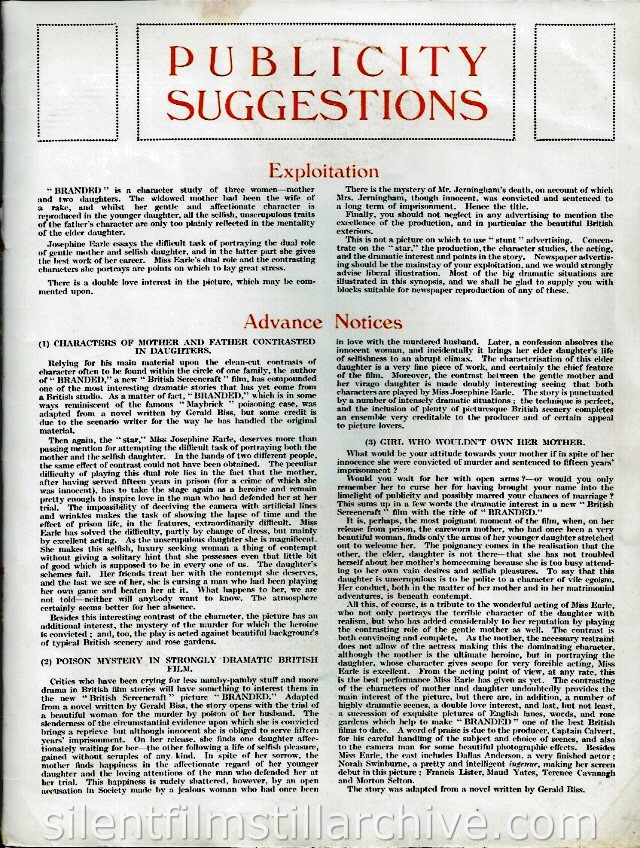
PUBLICITY SUGGESTIONS
Exploitation
"BRANDED" is a character study of three women -- mother and two daughters. The widowed mother had been the wife of a rake, and whilst her gentle and affectionate character is reproduced in the younger daughter, all the selfish, unscrupulous traits of the father's character are only too plainly reflected in the mentality of the elder daughter.
Josephine Earle essays the difficult task of portraying the dual role of gentle mother and selfish daughter, and in the latter part she gives the best work of her career. miss Earle's dual role and the contrasting characters she portrays are points on which to lay great stress.
There is a double love interest in the picture, which may be commented upon.
There is the mystery of Mr. Jerningham's death, on account of which Mrs. Jerningham, though innocent, was convicted and sentenced to a long term of imprisonment. Hence the title.
Finally, you should not neglect in any advertising to mention the excellence of the production, and in particular the beautiful British exteriors.
This is not a picture on which to use "stunt" advertising. Concentrate on the "star", the production, the character studies, the acting, and the dramatic interest and points in the story. Newspaper advertising should be the mainstay of your exploitation, and we would strongly advise liberal illustration. Most of the big dramatic situations are illustrated in this synopsis, and we shall be glad to supply you with blocks suitable for newspaper reproduction of any of these.
Advance Notices
(1) CHARACTERS OF MOTHER AND FATHER CONTRASTED IN DAUGHTERS.
Relying for his main material upon the clean-cut contrasts of character often to be found within the circle of one family, the author of "BRANDED," a new "British Screencraft" film, has compounded one of the most interesting dramatic stories that has yet come from a Brisish studio. As a matter of fact, "BRANDED," which is in some ways reminiscent of the famous "Maybrick" poisoning case, was adapted from a novel written by Gerald Biss, but some credit is due to the scenario writer for the way he has handled the original material.
Then again, the "star," Miss Josephine Earle, deserves more than passing mention for attempting the difficult task of portraying both th mother and the selfish daughter. In the hands of two different people, the same effect of contrast could not have been attained. The peculiar difficulty of playing this dual role lies in the fact that the mother, after having served fifteen years in prison (for a crime of which she was innocent), has to take the stage again as a heroine and remain pretty enough to inspire love in the man who had defended her at her trial. The impossibility of deceiving the camera with artificial lines and wrinkles makes the task of shwing the lapse of time and the effect of prison life, in the features, extraordinarily difficult. Miss Earle has solved the difficulty, partly by change of dress, but mainly by excellent acting. As the unscrupulous daughter she is magnificent. She makes this selfish, luxury seeking woman a thing of contempt without giving a solitary hint that she possesses even that little bit of good which is supposed to be in every one of us. The daughter's schemes fail. Her friends treat her with the contempt she deserves, and the last we see of her, she is cursing a man who had been playing her own game and beaten her at it. What happens to her, we are not told -- neither will anybody want to know. the atmosphere certainly seems better for her absence. Besides this interesting contrast of the character, the picture has an additional interest, the mystery of the murder for which the heroine is convicted; and, too, the play is acted against beautiful backgrounds of typical British scenery and rose gardens.
(2) POISON MYSTERY IN STRONGLY DRAMATIC BRITISH FILM.
Critics who have been crying for less namby-pamby stuff and more drama in British film stories will have something to interest them in the new "British Screencraft" picture "BRANDED." Adapted from a novel written by Gerald Biss, the story opens with the trial of a beautiful woman for the murder by poson of her husband. The slenderness of the circumstantial evidence upon which she is convicted brings a reprieve but although innocent she is obliged to serve fifteen years' imprisonment. On her release, she finds one daughter affectionately waiting for her -- the other following a life of selfish pleasure, gained without scruples of any kind. In spite of her sorrow, the mother finds happiness in the affectionate regard of her younger daughter and the loving attentions of the man who defended her at her trial. This happiness is rudely shattered, however, by an open accusation in Society made by a jealous woman who had once been in love with the murdered husband. Later, a confession absolves the innocent woman, and incidentally it brings her elder daughter's life of selfishness to an abrupt climax. the characterisation of this elder daughter is a very fine piece of work, and certainly the chief eature of the film Moreover, the contrast between the gentle mother and her virago daughter si made doubly interesting seeing that both characters are played by Miss Josephine Earle. the story is punctuated by a number of intense dramatic by a number of intensely dramatic situations; the technique is perfect, and the inclusion of plenty of picturesque British scenery completes an ensemble very criditable to the producer and of certain appeal to picture lovers.
(3) GIRL WHO WOULDN'T OWN HER MOTHER.
What would by your attitude towards your mother if in spite of her innocence she were convicted of murder and sentenced to fifteen years' imprisonment?
Would you wait for her with open arms? -- or would you only remember her to curse her for having brought your name into the limelight of publicity and possibly marred your chances of marriage? This sums up in a few words the dramatic interest in a new "British Screencraft" film with the title of "BRANDED."
It is, perhaps, the most poignant moment of the film, when, on her release from prison, the careworn mother, who had once been a very beautiful woman, finds on the arms of her younger daughter stretched out to welcome her. The poignancy comes in the realisation that the other, the elder, daughter is not there -- that she has not troubled herself about her m mother's homecoming because she is too busy attending to her own vain desires and selfish pleasures. To say that this daughter is unscrupulous is to be polite to a character of vile egoism. Her conduct, both in the matter of her mother and in her matrimonial adventures, is beneath contempt.
All this, of course, is a tribute to the wonderful acting of Mis Earle, who not only portrays the terrible character of the daughter with realism, but who has added considerably to her reputation by playing the contrasting role of the gentle mother as well. The contrast is both convincing and complete. As the mother, the necessary restraint does not allow of the actress making this the dominating character, although the mother is the ultimate heroine, but in portraying the daughter, whose character gives scope for very forcible cting, Miss Earle is excellent. From the acting point of view, at any rate, th is the best performance Miss Earle has given as yet. The contrasting of the characters of mother and daughter undoubtedly provides the main interest of the picture, but there are, in addition, a number of highly dramatic scenes, a double love interest, and last, but not least, a succession of exquisite pictures of English lanes, woods, and rose gardens which help to make "BRANDED" one of the best British films to date. A word of praise is due to the producer, Captain Calvert, for his careful handling of the subject and choice of scenes, and also to the camera man for some beautiful photographic effects. Besides Miss Earle, the cast includes Dallas anderson, a very finished actor; Norah Swinburne, a pretty and intelligent ingenue, making her screen debut in this picture; Francis Lister, Maud Yates, Terence Cavanagh and Morton Selton.
The story was adapted from a novel written by Gerald Biss.
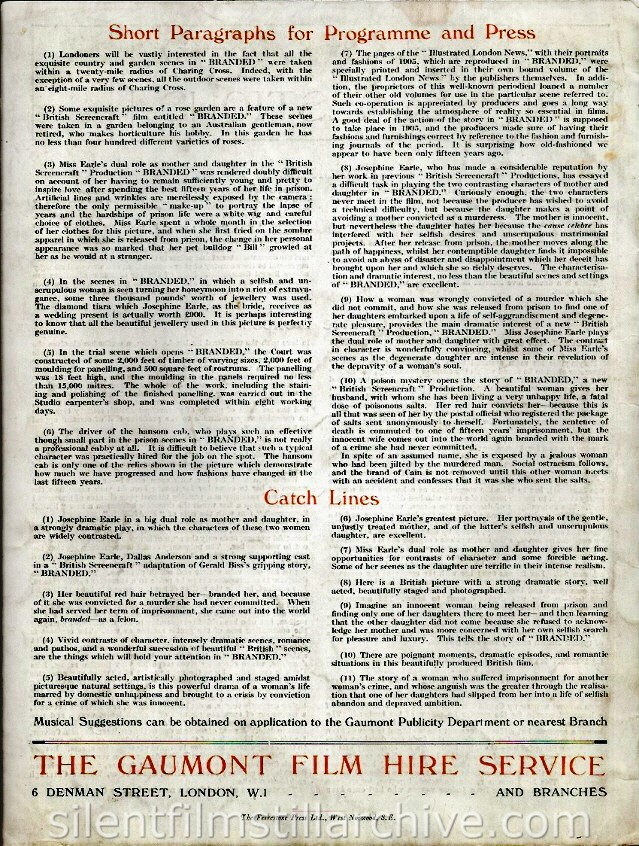
Short Paragraphs for Programme and Press
(1) Londoners will be vastly interested in the fact that all of the exquisite country and garden scenes in "BRANDED" were taken within a twenty-mile radius of Charing Cross. Indeed, with the exception of a very few scenes, all the outdoor scenes were teken within an eight-mile radius of Charing Cross.
(2) Some exquisite pictures of a rose garden are a feature of a new "British Screencraft" film eatitled (sic) "BRANDED." These scenes were taken in a garden belonging to an Australian gentleman, now retired, who makes horticulture his hobby. In this garden he has no less than four hundred different varieties of roses.
(3) Miss Earle's dual role as mother and daughter in the "British Screencraft" Production "BRANDED" was rendered doubly difficult on account of her having to remain sufficiently young and pretty to inspire love after spending the best fifteen years of her life in prison. Artificial lines and wrinkles are mercilessly exposed by he camers; therefore the only permissible "make-up" to portray the lapse of years and the hardships of prison life were a white wig and careful choice of clothes. Miss Earle spent a whole month in the selection of her clothes for this picture, and when she first tried on the sombre apparel in which she is released from prison, the change in her personal appearance was so marked that her pet bulldog "Bill" growled at her as he would at a stranger.
(4) In the scenes in "BRANDED," in which a selfish and unscrupulous woman is seen turning her honeymoon into a riot of extravagance, some three thousand pounds' worth of jewellery was used. The diamond tiara which Josephine Earle, as the bride, receives as a wedding present is actually worth £900. It is perhaps interesting to know that all the beautiful jewellery used in this picture is perfectly genuine.
(5) In the trial scene which opens "BRANDED," the court was constructed of some 2,000 feet of timber of varying sizes, 2,000 feet of moulding for panelling, and 500 square feet of rostrums. The panelling was 18 feet high, and the moulding in the panels required no less than 15,000 mitres. The whole of the work, including the staining and polishing of the finished panelling, was carried out in the Studio carpenter's shot, and was completed within eight working days.
(6) The driver of the hansom cab, who plays such an effective through small part in the prison scenes in "BRANDED," is not really a professional cabby at all. It is difficult to believe that such a typical character was practically hired for the job on the spot. The hansom cab is only one of the relics shown in the picture which demonstrate how much we have progressed and how fashions have changed in the last fifteen years.
(7) The pages of the "Illustrated London news, with their protraits and fashions of 1905, which are reproduced in "BRANDED," were specially printed and inserted in their own bound volume of the "Illustrated London News" by the publishers theselves. In addition, the proprietors of this well-known periodical loaned a number of their other older volumes for use in the particular scene referred to. Such co-operation is appreciated by producers and goes a long way towards establishing the atmosphere of reality so essential in films. A good deal of the action of the story in "BRANDED" is supposed to take place in 1905, and the producers made sure of having their fashions and furnishing correct by reference to the fashion and furnishing journals of the period. It is surprising how old-fashioned we appear to have been only fifteen years ago.
(8) Josephine Earle, who has made a considerable reputation by her work in previous "British Screencraft" Productions, has essayed a difficult task in playing the two contrasting characters of mother and daughter in "BRANDED." Curiously enough, the two characters never meet in the film, not because the producers has wished to avoid a technical difficulty, but because the daughter makes a point of avoiding a mother convicted as a murderess. the mother is innocent, but nevertheless the daughter hates her because the cause celebe has interfered with her selfish desires and unscrupulous matrimonial projects. After her release from prison, the mother moves along the path of happiness, whilst her contemptible daughter finds it impossible to avoid an abyss of disaster and disappointment which her deceit has brought upon her and which she so richly deserves. The characterization and dramatic interest, no less than the beautiful scenes and setting of "BRANDED," are excellent.
(9) How a woman was wrongly convicted of a murder which she did not commit, and how she was released from prison to find one of her daughters embarked upon a life of self-aggrandisement and degenerate pleasure, provides the main dramatic interes of a new "British Screencraft" Production, "BRANDED." Miss Josephine Earle plays the dual role of mother and daughter with great effect. The contrast in character is wonderfully convincing, whilst some of Miss Earle's scenes as the degenerate daughter are intense in their revelation of the depravity of a woman's soul.
(10) A poison mystery opens the story of "BRANDED," a new "Brisith Screencraft" Production. A beautiful woman gives her husband, with whom she has been living a very unhappy life, a fatal does of poisonous salts. her red hair convicts her -- because this is all that was seen of her by the postal official who registered the package of salts sent anonymously to herself. Fortunately, the sentence of death is commuted to one of fifteen years' imprisonment, but the innocent wife comes out into the world again branded with the mark of a crime she had never committed.
In spite of an assumed name, she is exposed by a jealous woman who had been jilted by the murdered man. Social ostracism follows, and the brand of Cain is not removed until this other woman meets with an accident and confesses that it was she who sent the salts.
Catch Lines
(1) Josephine Earle in a big dual role as mother and daughter, in a strongly dramatic play, in which the characters of these two women are widely contrasted.
(2) Josephine Earle, Dallas Anderson and a strong supporting cast in a "British Screencraft" adaption of Gerald Biss's gripping story, "BRANDED."
(3) Her beautiful red hair betrayed her -- branded her, and because of it she was convicted for a murder she had never committed. When she had served her term of imprisonment, she came out into the world again, branded -- as a felon.
(4) Vivid contrasts of character, intensely dramatic scenes, romance and pathos, and a wonderful succession of beautiful "British" scenes, are the things which will hold your attention in "BRANDED."
(5) Beautifully acted, artistically photographed and staged amidst picturesque natural settings, is this powerful drama of a woman's life marred by domestic unhappiness and brought to a crisis by conviction for a crime of which she was innocent.
(6) Josephine Earle's greatest picture. Her portrayals of the gentle, unjustly treated mother, and of the latter's selfish and unscrupulous daughter, are excellent.
(7) Miss Earle's dual role as mother and daughter gives her fine opportunities for contrasts of character and some forcible activg. Some of her scenes as the daughter are terrific in their intense realism.
(8) Here is a British picture with a stong dramatic story, well acted, beautifully staged and photographed.
(9) Imagine an innocent woman being released from prison and finding only one of her daughters there to meet her -- and then learning that the other daughter did not come because she refused to acknowledge her mother and was more concerned with her own selfish search for pleasure and luxury. This tells the story of "BRANDED."
(10) There are poignant moments, dramatic episodes, and romantic situations in the beautifully produced British film.
(11) The story of a woman who suffered imprisonment for another woman's crime, and whose anguish was the greater through the relisation that one of her daughters had slipped from her into a life of selfish abandon and depraved ambition.
Musical Suggestions can be obtained on application to the Gaumont Publicity Department or nearest Branch
THE GAUMONT FILM HIRE SERVICE
6 DENMAN
STREET, LONDON, W.1 - - - - - - - - AND BRANCHES.
with Josephine Earle and Dallas Anderson. Directed by E. H. Calvert. British Screencraft/Gaumont.
More Information on this film...
Books
(none)
Last Modified October 25, 2015



















